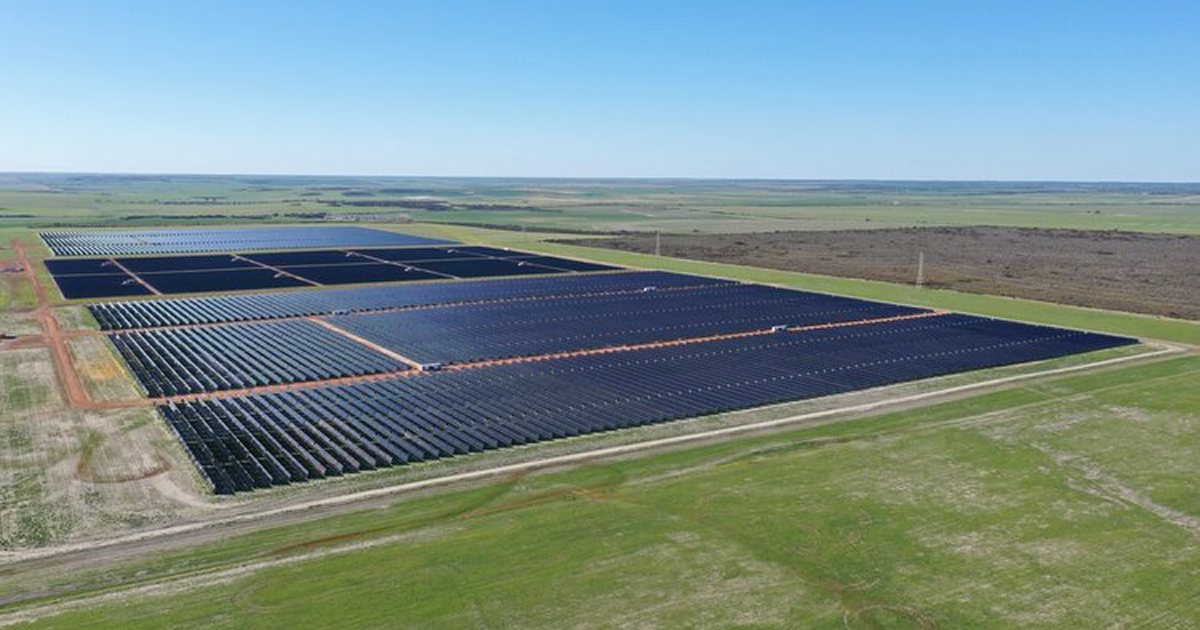
Australia’s first utility-scale solar PV project, Greenough River Solar Farm, has been operating for a decade.
Situated near Walkaway in Western Australia – a small town in the City of Greater Geraldton local government area – the clean energy facility officially opened in October 2012.
The first stage of Greenough River Solar Farm commenced operations with 150,000 First Solar Series 3 thin film PV panels for a total capacity of 10MW (AC). The original installation is indicated in the image above as the darker coloured arrays of panels.
Greenough River Solar Farm held onto the crown of Australia’s largest solar farm until 2014 when it was knocked off the throne by the 20 MW Royalla solar farm in the ACT.
From the get-go, energy from stage one of Greenough River Solar Farm has been purchased by WA’s Water Corporation to offset the electricity requirements of the Southern Seawater Desalination Plant near Binningup.
Greenough River Solar Farm saw expansion with a second stage added in 2020 using 300,000 First Solar Series 4 panels; bringing the PV power station’s total capacity to 40MW. While the original 10MW was mounted on fixed racking, the 30MW expansion involved single axis tracking systems enabling the panels to follow the sun throughout the day.
Greenough River Solar Farm now generates an estimated 98 gigawatt-hours of clean, renewable electricity per year.
Operations and Maintenance at the solar farm is handled by NovaSource Power Services, which took over the role from First Solar’s in house O&M services branch last year.
“Ensuring the health and performance of Greenough River Solar Farm has been an honour – it will forever be an important part of Australia’s energy history,” said NovaSource’s, Daman Cole. “We are excited to continue to service this engineering marvel and look forward to more renewable developments coming online to provide clean energy to Australia.”
Solar Panels Have Come A Long Way Since 2012
As mentioned, the first stage of Greenough was 10MW capacity achieved with 150,000 solar panels. The 10MW is the AC rating, but the DC rating is around 12.68MW – making the panels just 85 watts each. The second stage was a 30MW expansion involving around 300,000 panels. So, based on an assumed DC rating of approximately 36MW 1, those panels would be around 120 watts each.
Thin film PV tech – in this case Cadmium Telluride (CadTel) – is less efficient than that used in crystalline silicon based solar panels. I couldn’t find conversion efficiency for the Series 3 panels used for stage one at Greenough, but First Solar’s average module efficiency at the end of 2011 was reportedly 11.7 per cent. The Series 4 has a conversion efficiency of 15.3% to 17%. First Solar’s latest panels – Series 7 TR1 – are available in wattages of up to 540W and boast efficiencies of up to 19.3%. The Series 7 TR1 panels are also physically huge: 2.3m x 1.3m and weighing in at a touch under 40 kilograms.
First Solar has come a long way and so too have crystalline silicon solar panels; with conversion efficiencies of 20% or more nowadays. CadTel PV installations on residential and commercial rooftops have been comparatively rare as more rooftop space is required. But even in terms of utility-scale solar, crystalline silicon panels are more commonly used for solar farms and offer far higher capacities – up to 700 watts.
Home Solar Cost – 2012 vs. 2022
While taking a trip down memory lane concerning Greenough, I thought I’d also look at how much home solar power cost in Australia back in 2012 compared to 2022.
A 5kW solar system cost $10,900 on average after subsidies in September 2012. According to the SolarQuotes Australian Solar Price Index, 5kW system prices averaged $6,200 (6.6kW system: $6,250, 10kW solar system: $10,100) in September this year, fully installed and after subsidies.
For current pricing ranges of good quality systems of various capacities, check out SQ’s solar panels cost page.
Footnotes
- I couldn’t locate official figures for the DC rating for stage 2. ↩

 RSS - Posts
RSS - Posts



Speak Your Mind